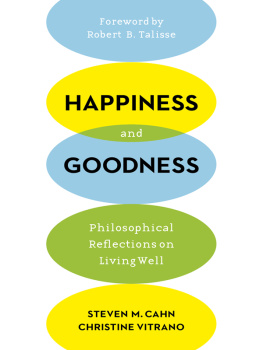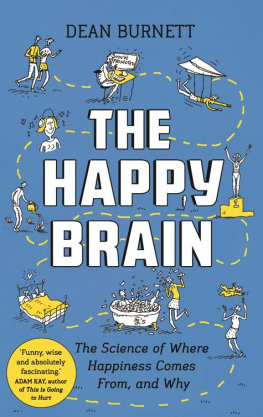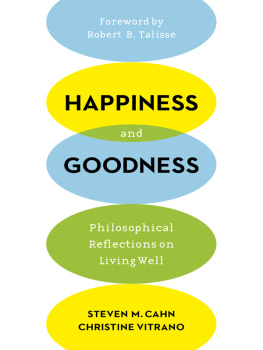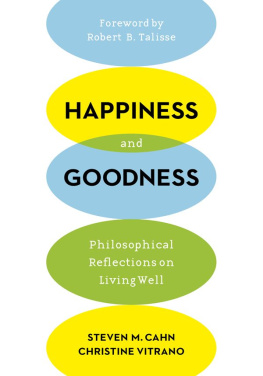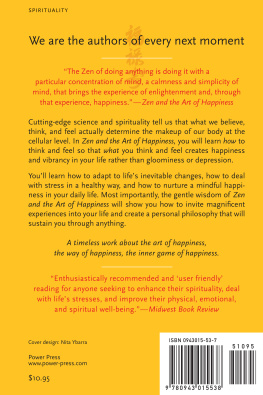THE NATURE AND VALUE OF HAPPINESS
THE NATURE
AND
VALUE OF HAPPINESS
CHRISTINE VITRANO
Foreword by Steven M. Cahn

A Member of Perseus Books Group
Westview Press was founded in 1975 in Boulder, Colorado, by notable publisher and intellectual Fred Praeger. Westview Press continues to publish scholarly titles and high-quality undergraduate- and graduate-level textbooks in core social science disciplines. With books developed, written, and edited with the needs of serious nonfiction readers, professors, and students in mind, Westview Press honors its long history of publishing books that matter.
Copyright 2014 by Westview Press
Published by Westview Press,
A Member of the Perseus Books Group
All rights reserved. No part of this book may be reproduced in any manner whatsoever without written permission except in the case of brief quotations embodied in critical articles and reviews. For information, address Westview Press, 2465 Central Avenue, Boulder, CO 80301.
Find us on the World Wide Web at www.westviewpress.com.
Every effort has been made to secure required permissions for all text, images, maps, and other art reprinted in this volume.
Westview Press books are available at special discounts for bulk purchases in the United States by corporations, institutions, and other organizations. For more information, please contact the Special Markets Department at the Perseus Books Group, 2300 Chestnut Street, Suite 200, Philadelphia, PA 19103, or call (800) 810-4145, ext. 5000, or e-mail .
Designed by Pauline Brown
Typeset in 11 point Adobe Garamond Pro
Library of Congress Cataloging-in-Publication Data
Vitrano, Christine.
The nature and value of happiness / Christine Vitrano.
pages cm
Includes bibliographical references and index.
ISBN 978-0-8133-4728-8 (e-book)
1. Happiness. I. Title.
B105.H36V58 2013
170dc23
2012050399
10 9 8 7 6 5 4 3 2 1
For Julian and Gabriel, who have made me
happier than I ever could have imagined
CONTENTS
W hat is happiness? How can it be achieved? Should attaining it be our ultimate goal? Might pursuing it ever conflict with our moral obligations?
These questions have been explored by philosophers since well over two millennia ago, when Socrates, then Plato, then Aristotle, then Epicurus strode the streets of Athens. And the issues have remained of concern throughout the centuries, discussed by such towering figures as Augustine, Aquinas, Hume, Kant, and Nietzsche, as well as leading philosophers of our own time. Indeed, as long as human life continues on earth, so probably will speculation about happiness.
Professor Vitrano has devoted many years to considering the numerous issues that surround happiness, and her understanding of the topic runs deep. Now, in this engaging book, she offers a remarkably lucid presentation of the subject, eschewing arcane terminology, obscure references, and convoluted arguments. She also illustrates her essential points with a host of illuminating examples.
I find her reasoning persuasive and her conclusions compelling. But even those who differ with her will appreciate the clarity of her style and her commitment to common sense.
In fact, reading her delightful book may even contribute to your happiness.
E veryone wants to be happy, but if we ask the simple question What is happiness? something that seems so familiar, even obvious, suddenly becomes difficult to explain. More than two thousand years ago, the ancient Greeks inquired into the nature of happiness, and much of the work in the history of ethics is focused on answering their simple question: how can we live happy lives? Aristotle, for example, assumed that even if we have very different understandings of what happiness is and how we go about achieving it, everyone would agree that being happy is the key to living and doing well.
When I teach my class on happiness, I often begin the first lecture with a free association. I write the word happiness on the board and ask the class to share whatever comes to mind. My query is usually met with complete silence. Of course, I know my students have a lot to say about happiness, but I understand their initial hesitation. For all the familiarity of the word, most people recognize that happiness is a complicated concept, and no one wants to risk saying something foolish. After assuring the students that I am not seeking a formal definition, they often relax, and soon the entire board is filled with ideas connected in some way to happiness.
The point of this exercise is not to reach a consensus on how to define happiness, for we have the entire semester to accomplish that goal. Rather, I want my students to realize that they already possess key insights into the nature of happiness, even if their understanding is incomplete. Indeed, I believe we all have important intuitions about when a person is happy or unhappy, and these form the basis of our understanding of the term. These intuitions are useful when we analyze various philosophical views of happiness, and throughout this book, I shall appeal to these intuitions in order to assess particular theories of happiness.
When we examine the philosophical literature on happiness, we quickly note how little our struggles with this concept have changed in more than two thousand years. Although the rise of technology has improved many aspects of our lives, we are still grappling with the same questions posed by the ancient Greeks about how we should live and how we can achieve happiness. Recently, the work of philosophers has been eclipsed by empirically minded researchers in fields as diverse as psychology, sociology, and economics. Thus, research on happiness is no longer confined to academic journals, but rather frequently appears in newspaper and magazine articles. For example, psychologist Daniel Gilberts book The Pursuit of Happiness was a national best seller, and Gilbert himself recently hosted a PBS special series entitled This Emotional Life.
I do not wish to downplay the importance of this empirical work on happiness, for it is interesting and sometimes even surprising. I do wish, however, to emphasize the difference between the kinds of questions these empirical researchers ask and the questions that interest philosophers. Empirical researchers generally begin from the premise that the concept of happiness itself is something we already understand and is easily measured. Their studies typically look at the kinds of activities that promote or hinder happiness, which they often gauge using the subjects first-person reports of her satisfaction or dissatisfaction with her life. But this research begs the question against the philosopher, whose starting point is much more basic. In philosophy, we are not assuming we already have a clear understanding of happiness, for that is precisely why we are investigating the topic. Our goal is to answer questions relating to the nature and value of happiness, but providing answers to these kinds of questions requires a more theoretical approach.
Next page



